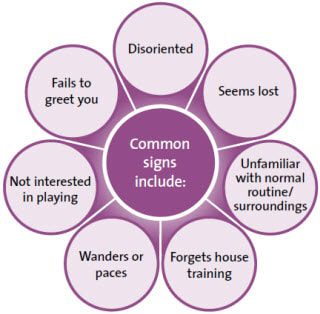
Brain Aging in Dogs: Symptoms and Treatment
Contents
What is brain aging in dogs?
Like the rest of the body, the brain is subject to the aging process. Damage to a dog’s brain cells can lead to behavioral changes.
It is important to remember that aging is a natural part of your dog’s life. Half of all dogs aged eight years and older show some signs of brain aging, and as they get older, the pet begins to behave differently. With advances in medicine and pet nutrition, the right dog food and veterinary advice can help limit the effects of brain aging and keep your dog active.
What causes my dog’s brain to age?
Aging affects the entire body of a dog, including its brain. In recent years, scientists have made great strides in understanding the aging process. Today, many experts agree that aging is primarily caused by unstable oxygen molecules called free radicals. As the brain ages, free radicals cause cell damage. Although some free radicals may be the result of environmental influences, most of them are produced during the body’s own metabolism.
The aging process affects all systems and organs of the dog’s body, including the brain. The result is a cessation of brain function and often changes in behavior that were not present in a young dog.
Why does the brain age?
- The high content of lipids is the main goal of free radicals.
- High demand for oxygen.
- Limited opportunities for antioxidant protection and recovery.
- The tissue of the nervous system is especially vulnerable to the effects of free radicals.
Older, damaged mitochondria produce less energy and more highly toxic free radicals.
- Mitochondria are a source of energy within cells, but also produce highly toxic free radicals as a by-product.
- As the brain ages, mitochondria produce more and more free radicals.
- Damage caused by free radicals leads to reduced brain function and possible behavioral changes.
There is little that can be done to stop the production of free radicals. Scientists have found that antioxidants, vitamins and minerals neutralize the damage caused by free radicals and can help maintain normal behavior for a long and healthy life.
Does my dog show signs of brain aging?
Changes in brain function occur very slowly. The first thing you notice may be small differences in behavior, such as longer sleep, lack of energy, or irritability. You may not notice these changes until they begin to interfere with your dog’s daily life. The following signs are commonly used by veterinarians in diagnosing brain aging (dementia, senile dementia).
- Unclean behavior in the house.
- No more begging for the street.
- Does not greet family members.
- Doesn’t want attention/affection.
- Does not recognize familiar people or places.
- Does not respond to verbal commands.
- Sleep more during the day or less at night.
- Appears lost or confused in the house or yard.
- Wandering or walking back and forth.
- Looks into the void or at the walls.
IMPORTANT. If your dog has any of these signs, discuss it with your veterinarian.
Treatment: the importance of nutrition
In order for your pet to be young and healthy for as long as possible, proper nutrition is of great importance. As your dog ages, feed him foods rich in antioxidants and essential nutrients to keep him active and alert. Older age does not necessarily mean a deterioration in the quality of life of a pet, and his health and condition in general largely depend on the food he eats. A balanced diet is an essential part of an active, healthy lifestyle. For an accurate diagnosis and treatment options, always consult your veterinarian and ask them to recommend the best food to keep your dog’s brain healthy.
Brain Aging Questions to Ask Your Veterinarian
- What are the health risks in aging dogs?
- Should older dogs visit the veterinarian more often?
- Do older dogs have special nutritional needs?
- Will Hill’s Science Plan Senior Vitality help my aging dog’s brain?
- What if I have multiple dogs? Can I feed them all the same food?
- How can nutrition help with this condition? What is the benefit of therapeutic nutrition as part of a treatment that may include pills?
- What are the pros and cons of using nutrition to keep my dog healthy and alert?
- How long do I need to feed my dog the recommended food?
- Ask how diet foods can contribute to a dog’s long-term health benefits?
- What is the best way to contact you or your clinic if I have questions (email/phone)?
- Ask if you will need to come back for a follow-up appointment.
- Ask if you will receive a notification or email reminder of this.





